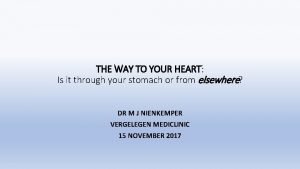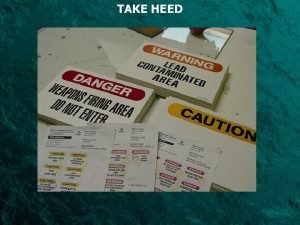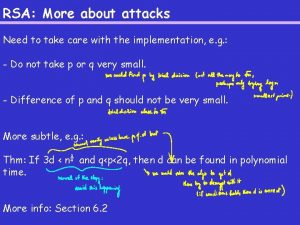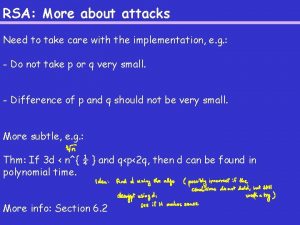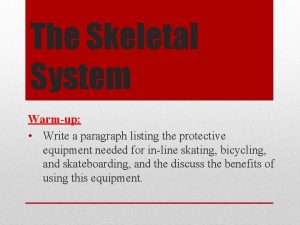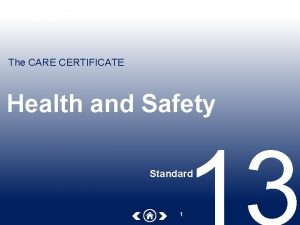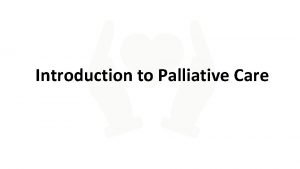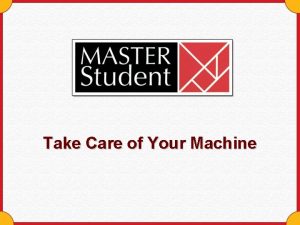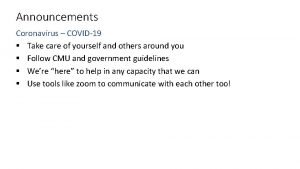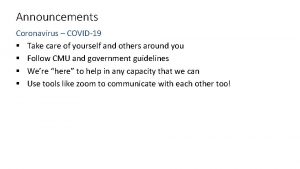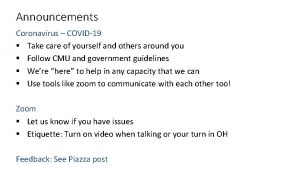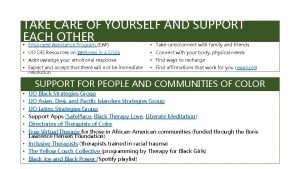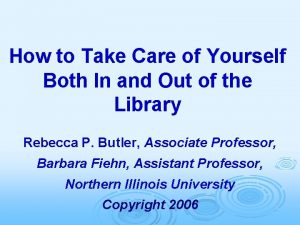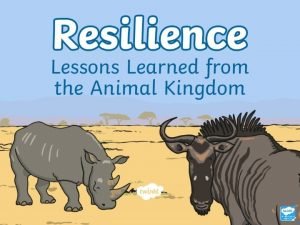Take care of yourself Take care of yourself























- Slides: 23

Take care of yourself

Take care of yourself This module will cover: » » » The three under pinning values to stay safe at work Health and Safety – The law and John Lewis Policy Taking care in a retail business Emergency situations Mandatory training you need to complete

Module objectives » Raise your awareness of the three core safety values which, combined with your health and safety training, will keep you safe at work » Explain the Partnership’s approach to creating a safe place to work for Partners and customers and complying with Health and Safety Legislation » Identify the mandatory training you need to complete » Explain where to find guidance on what to do in an emergency. Highlight your responsibilities and the Partners who are trained to help Partner Development W

The three under pinning values to stay safe at work The Partnership Safety Department's primary responsibility is to assist the business to develop and implement preventative measures that reduce the likelihood of accidents, in a way that is compliant with health and safety legislation and the civil law duty of care. The Partnership holds the belief that everyone should go home at the end of each day fit and well. Generally we do not perform hazardous activities within the Partnership, therefore Partners should not be putting themselves at risk. These are three core values that all Partners must acknowledge which, combined with health and safety training, will keep them safe at work. 1 Nothing we do is worth being harmed for 2 Unsafe behaviour will be challenged, not rewarded 3 Partners are empowered to challenge safety issues Any reasonable challenge is entitled to a fair response

Three core values to stay safe at work Nothing we do is worth being harmed for 1 John Lewis is a retailer selling goods and services. There are no tasks or parts of our undertaking where we wish Partners to place their safety, or that of others, in second place. Preventing all incidents may not be possible but where there is significant potential for injury, risk assessments will have highlighted this and a safe way of working will have been identified. Following the relevant Work Instruction Notes (WINs) and safe ways of working, will minimise the chance of an injury. Partner Development W

Health Safety Law Three core and values to stay safe at work 2 Unsafe behaviour will be challenged, not rewarded We cannot walk past someone doing something unsafe or leave people to struggle on their own. If we do, we ourselves Partners are open to challenge others. Asking someone to do should Lifting heavy boxes ofby stock, moving follow something that may put them at risk, is simply not how wethe equipment, over reaching from relevant should beand doing things. ladders using scissors incorrectly Work Instruction Neither we congratulate to openshould packages are commonpeople for putting themselves in an unsafe position helping customer – the. Notes safety(WINs) of examples of wherewhen injuries may aoccur if unsure on Partners really does come the first. tasks more frequently because how to use were not carried out in a safe way. equipment. Partner Development W

andcore Safety Law Three values to stay safe at work 3 Partners are empowered to challenge safety issues Any reasonable challenge is entitled to a fair response The Partnership has various forums for Partners to raise concerns and receive answers about all areas of the business – the Gazette, Democratic bodies and team meetings. You should feel comfortable to challenge unsafe work practices directly with your colleagues in the first instance, for example not using a ladder safely. Ongoing safety concerns should be raised with your line manager, though any Partner can seek advice directly from the Partnership Safety Department.

John Lewis Partnership Health & Safety Policy The Partnership’s Health & Safety Policy is the formal expression of our aims and explains how we intend to ensure the health and safety of Partners, customers, contractors and suppliers. The policy outlines how we will be compliant with Health and Safety legislation. Your responsibilities All Partners within the business share some burden of responsibility for achieving a safe and healthy working environment by the way in which they act, behave and respond to any information, instruction and training they receive. Where to find it As well as being on the branch notice board, the policy and other documents detailing our approach can be found on the Safety pages of the Partner Intranet. The Health & Safety legislation applies to ALL employers and employees; a brief summary is given on the following slides.

Health and Safety Law All employees have a right to work in places where risks to their health and safety are properly controlled. Health and safety is about stopping you getting hurt at work or ill through work. Your employer is responsible for health and safety, but you must help. What employers must do for you 1. Decide what could harm you in your job and the precautions to stop it. This is part of risk assessment 2. In a way that you can understand, explain how risks will be controlled and tell you who is responsible for this What you must do 1. Follow the training you have received when using any work items your employer has given you 2. Take reasonable care of your own and other people’s health and safety 3. Co-operate with your employer on health and safety 4. Tell someone (your employer, supervisor, or health and safety representative) if you think the work or inadequate precautions are putting anyone’s health and safety at serious risk.

Taking. Health care inand a retail business Safety Law Risk Assessment The Partnership recognises that most Health & Safety law is risk-led and our policy is to eliminate or minimise Health & Safety risks, as far as is reasonably practicable. We aim to reduce the likelihood of incidents occurring and reduce work-related ill health. The Partnership completes a safety risk assessment on all areas of the business. This identifies hazardous tasks which in turn drives identification of equipment that can make a task safer to perform and training to ensure we have competent and safe Partners in all areas of the Partnership.

Taking. Health care inand a retail business Safety Law Risk Assessment The top safety topics that have been identified to have the highest level of risk, within retail and distribution are: Areas where there are vehicles COSHH (where relevant) Manual Handling Use of work equipment House keeping

Taking care inand a retail business Health Law Taking care in a. Safety retail business Areas where there are vehicles There areas within the Partnership which involve a significant amount of vehicle movement. Below are a few examples of where vehicles and pedestrians mix: » Car parks » Warehouses » Receiving docks/ bay where goods are unloaded » Customer collection points When working or visiting these areas it is vital you follow the rules to stay safe. » If you are unsure speak to the manager on duty

Taking care in a retail business COSHH Control of substances hazardous to health » No everyone uses chemicals significantly in their role. If your department is involved in chemical handling, you will receive specific instructions and training » Ensure you complete your COSHH mandatory training attached to your role on Partnerlink and within the Partner Development Website (PDW)

Taking care in a retail business Use of work equipment Most equipment that you will use within your role can be used sensibly, without formal training. That said, the relatively higher frequency of incidents caused when using ‘day to day equipment, ’ means you must take care to use it properly. » Within the mandatory training section of the Partner Development Website (PDW) you can access short Work Instruction Notes (WINs) » Depending on where you work, relevant Work Instruction Notes (WINs) will be attached to your role within Partnerlink, for example using ladders and cages, but all are available to view Partner Development W

Taking care in a retail business Manual Handling All Partners, at some stage, whether they work on the shop floor, in an office, a warehouse or within catering and hospitality need to consider manual handling safety. It is your responsibility to work safely and not to put yourself at risk when lifting items. » Ensure you complete your mandatory training attached to your role on Partnerlink and within the Partner Development Website (PDW) » If your department is involved in heavy lifting, such as Goods Handling, Stock Management or within Distribution, you will receive specific instructions and manual handling training » The specific manual handling training modules include Shapes, Moves, Elements and Taking Stock

Taking care in a retail business Housekeeping Preventing accidents before they happen Good housekeeping is a core discipline within the retail world. Poor housekeeping causes incidents (as well as being a major cause of stock damage and inefficiency. ) It is your responsibility to work in a neat and tidy manner and alert a manager to any potential hazards. Be on the lookout for: » Cluttered stockrooms » Blocked exits » Items protruding into aisles » Stock overhanging on racking » Badly filled cages » Slippery entrances during wet weather Customers are also covered by health and safety. It is your responsibility, as a Partner, to ensure the shop floor is a safe environment in which to shop

Taking care in a retail business Housekeeping Safety signs and what they mean Signs help keep us safe. It is your responsibility to familiarise yourself with the safety information available to you, within the areas you work and access across the business. Blue - mandatory must do Orange – COSHH known health effects Red – prohibition must not do Green - safe condition follow this Yellow – warning look out for Non coloured - general information

Emergency situations Health and Safety Incidents Within the Partnership we use the word incident to describe any untoward event that did or could have resulted in someone being harmed. We use the term ‘what might have happened’ and these incidents must be recorded also, in case there are lessons to be learnt that could prevent a future incident. You must report any incidents to a first aider or your line manager; they will arrange to record the incident on our Incident Reporting and Investigation System (IRIS). » You must find out how to contact a first aider within your branch or business unit » Ask your sponsor or line manager if there any branch specific procedures you should follow, or to clarify anything you find unclear All First Aiders have a work related first aid qualification. On duty first aiders are on call to attend to health and safety incidents and they receive a small payment for this. First aiders gain a life skill that can be used in and outside of John Lewis. » If you are interested in becoming a First Aider speak to your line manager

Emergency situations Fire » Ensure you complete your Fire & Safety mandatory training attached to your role on Partnerlink and within the Partner Development Website (PDW) » Ask your sponsor or line manager if there any branch specific procedures you should follow or to clarify anything you find unclear Partner Development W

Emergency situations Other Incidents and Emergencies There are many incidents which could occur during the working day. The Partnership has tried to plan for as many eventualities as possible. These may include: » Evacuation » Bomb threat » Suspicious packages » Invacuation » Public demonstrations » Floods » Lost children » Ensure you complete your mandatory and any other incident and emergency training attached to your role on Partnerlink and within the Partner Development Website (PDW) » Ask your sponsor or line manager if there any branch specific procedures you should follow or to clarify anything you find unclear Partner Development W

Key learning points » Nothing we do is worth being harmed for » Follow the core values to stay safe » Everyone has a responsibility for safety » Complete the relevant Health and Safety training to stay safe at work » Work safely and tidily to prevent incidents » Think for your customers to keep them safe » Raise any concerns with your line manager

What’s next » Complete mandatory training attached to your role within Partnerlink » Complete additional safety training attached to your role within Partnerlink » Complete a floor walk of your department with your line manager or sponsor to identify any particular hazards » Identify how to contact a first aider within your branch/ business unit » Ask your sponsor or line manager if there any branch specific Emergency & Incident procedures you should follow » If you transfer branch/ business unit ensure you find out the new local safety practices and information to keep you safe at work » Access further safety information via the Partner Intranet and PDW Partner Development W

Take care of yourself
 Heart and stomach
Heart and stomach Leadership personal statement examples
Leadership personal statement examples Youtube yourself broadcast yourself
Youtube yourself broadcast yourself Know yourself to lead yourself
Know yourself to lead yourself Check yourself before you wreck yourself origin
Check yourself before you wreck yourself origin Myself yourself himself
Myself yourself himself Corinthians 10 12
Corinthians 10 12 Primary, secondary, tertiary care
Primary, secondary, tertiary care Take a bus or take a train
Take a bus or take a train Rsa take care
Rsa take care Youhol
Youhol Take care drake traduction
Take care drake traduction Take care rsa
Take care rsa Take care of sense organs
Take care of sense organs How to take care of your nervous system
How to take care of your nervous system Hello take care
Hello take care Take care dalam islam
Take care dalam islam How to take care of your skeletal system
How to take care of your skeletal system God will take care of you
God will take care of you Magnetii sunt corpuri care
Magnetii sunt corpuri care Care certificate answers standard 1
Care certificate answers standard 1 Palliative care vs hospice care
Palliative care vs hospice care Hip fracture care clinical care standard
Hip fracture care clinical care standard Vietuitoare care nasc pui vii
Vietuitoare care nasc pui vii
